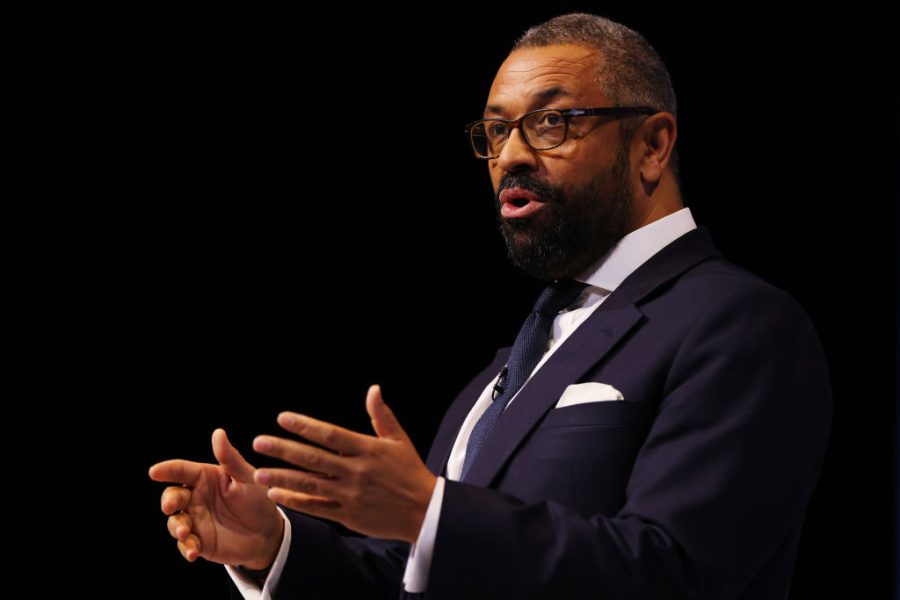The Conservatives were nearly wiped out at last July’s general election, and the party is currently trailing Nigel Farage’s Reform in the polls. You might think then that the handful of remaining ‘big beasts’ on the Tory benches would decide to try and work together. Instead, a split appears to be emerging in the party over net zero.
James Cleverly took a thinly-veiled swipe at Kemi Badenoch’s green policy in a speech to the Conservative Environment Network (CEN) last night. In one of her first major policy interventions as leader, Badenoch abandoned the Conservatives’ support for the country reaching net zero emissions by 2050. But Cleverly has now argued that the party should not give up on the climate agenda. In his speech, he took aim at what he called ‘neo-luddites’ on the right who seem scared of using green technologies to protect the environment:
Why are we closing steel plants in this country only to buy steel from abroad?
Conservative governments have made remarkable strides in offshore wind energy. Our ambitious policies have driven investment, positioning the UK as a global clean energy superpower. This is not just about installing turbines; it’s a strategic vision linking energy policy with our economic and national security priorities.
Which ‘neo-luddites’ did he have in mind? Whoever Cleverly is referring to, his speech is far from helpful for a Tory party that is down in the dumps.
Cleverly talks about the role of the private sector in meeting the net zero target. Well, the problem with that is that successive governments, including Tory ones, have made manufacturing utterly uncompetitive in this country due to energy costs. And why are energy costs so high? Because of Britain’s net zero policy and its precursors. Europe could have had a thriving renewables industry. Instead, our energy and industrial policies have resulted in almost total Chinese dominance.
Badenoch has come in for plenty of criticism since she became Tory leader, but her stance on energy is the right one. In March, at a speech announcing a series of policy commissions, Badenoch said that it was impossible to hit the 2050 target.
‘Anyone who has done any serious analysis knows it cannot be achieved without a significant drop in our living standards or, worse, by bankrupting us,’ she said. Badenoch tasked shadow energy secretary Claire Coutinho with:
Finding and working with the people who know the truth and who can come up with achievable solutions, people who can answer from experience, how we can deliver cheap and clean energy without bankrupting businesses, without eye-watering bills for households, without dependencies on hostile or unstable countries.
As Badenoch has suggested, improving the environment is a noble objective and we should do what we can to do so. But committing to an arbitrary target is a mistake because you can end up with perverse policy outcomes. Why are we closing steel plants in this country only to buy steel from abroad, produced using electricity from coal-fired stations? Why do we punish farmers here, only to import more food? Why are we refusing to drill for oil and gas from our own waters, with the associated jobs and tax revenue that it would bring, only to ship LNG from America?
The UK does have unique strengths, particularly in our university research departments. Instead of blowing billions of pounds on transforming the grid, why not invest massively in research and development (R&D) to seek to create novel green technologies and processes that could be sold around the world?
Let’s suppose that the UK produced the ‘cleanest’ steel and cement in the world in large quantities, industries that currently contribute 10 per cent of global emissions. Would we move closer to net zero in the UK? No. Would global emissions fall? Yes.
Or if Rolls-Royce were to become a global market leader in SMR nuclear installations, with much of the component manufacturing done in the UK, would we move closer to net zero? No. Would global emissions fall? Yes. This, then, should be the objective – not arbitrary targets.
Cleverly’s speech is poorly timed. At the Hamilton, Larkhall and Stonehouse by-election today, the Conservatives may well lose their deposit. But during this time of existential crisis for the party, the starting gun appears to have been fired on yet another bout of psychodrama, with contestants jockeying for position in front of activists. It’s a shame that on this topic, one of the leading contenders seems to be opting for good vibes over good policy.







Comments